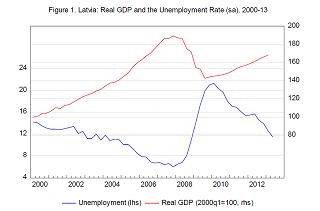Glendinning, S., (2013), “The work of J.S. Mill shows the danger in eliminating the differences between European nations”, European Politics and Policy Blog, 30 September. Simon Glendinning writes on the English philosopher John Stuart Mill’s views on Europe. He notes that Mill saw Britain as being very much a part of Europe, but that he also recognised important differences between European nations. Far from seeing these differences as a weakness, …Read More
Germany as Currency Manipulator
Krugman, P., (2013), “Germany as Currency Manipulator”, The New York Times, The Conscience of a Liberal Blog, 27 September. […] The general point is that if we imagine a euro breakup, I think everyone would agree that the new mark would soar in value, making German manufacturing much less competitive. The German public imagines that it is being cruelly exploited for the benefit of lazy southerners; arguably, what’s really happening …Read More
As good as it gets in Latvia?
Hugh, E., (2013), “As good as it gets in Latvia?”, Fistfulofeuros Blog, 29 September. “This raises a final question, which, while not central to the issues of this paper, is nevertheless intriguing: How can a country with a low minimum wage, weak unions, limited unemployment insurance and employment protection, have such a high natural rate [of unemployment]?” “To summarize, the actual unemployment rate is still probably higher than, but close …Read More
Notes on Internal Devaluation
Lizoain, D., (2013), “Notes on Internal Devaluation”, Social Europe Journal, 27 September. The Spanish government’s formula for exiting the crisis is called an internal devaluation. This is a euphemism. They are attempting a generalized reduction in wages that requires a weakening of collective bargaining. For this reason, it is worthwhile to explore the concept of internal devaluation in more detail. The theory and the historical evidence is profoundly weak. In …Read More
Until Angela Merkel forms a governing coalition, Greece will continue to be in limbo
Exadaktylos, T., (2013), “Until Angela Merkel forms a governing coalition, Greece will continue to be in limbo”, European Politics and Policy Blog, 27 September. Following last weekend’s German elections, Theofanis Exadaktylos writes on the Greek reaction to Angela Merkel’s victory. He notes that the elections received extensive coverage in the Greek media due to their implications for the country’s economic crisis. Nevertheless, the general perception is that Germany is unlikely …Read More
Dealing with High Debt in an Era of Low Growth
Ali Abas, S.M., Akitoby, B., Andritzky, J.R., Berger, H., Komatsuzaki, T. and Tyson, J., (2013), “Dealing with High Debt in an Era of Low Growth”, IMF Staff Discussion Note, SDN/13/07, September. Τask has become particularly challenging in European advanced economies where expectations of low growth and limits to monetary policy support are shifting the burden of adjustment onto fiscal consolidation. The SDN will investigate the main drivers behind successful past …Read More
The Sovereign Debt Crisis: Placing a curb on growth
Brender, A., Pisani, F. and Gagna, E., (2013), The Sovereign Debt Crisis: Placing a curb on growth, Brussells: Centre for European Policy Studies (CEPS). This book provides an update to the major 2012 study by the same authors on the dual role of the public sector as the provider of the ultimate riskless asset and, at the same time, the source of a potential major systemic risk. In this second …Read More
Toward A Fiscal Union for the Euro Area
Allard, C., Brooks, P.K., Bluedorn, J.C., Bornhorst, F., Ohnsorge, F. and Christopherson Puh, K.M., (2013), “Toward A Fiscal Union for the Euro Area”, IMF Staff Discussion Note, SDN/13/09, September. The crisis has exposed a critical gap in EMU: the capacity for country-level shocks, whether exogenous or home-grown, to spread across the euro area, calling into question the viability of the common currency. This paper explores the role that deeper fiscal …Read More
The Euro Area Crisis: Need for a Supranational Fiscal Risk Sharing Mechanism?
Furceri, D. and Zdzienicka, A., (2013), “The Euro Area Crisis: Need for a Supranational Fiscal Risk Sharing Mechanism?”, IMF Working Papers Series, WP/13/198, September. The aim of this paper is to assess the effectiveness of risk sharing mechanisms in the euro area and whether a supranational fiscal risk sharing mechanism could insure countries against very severe downturns. Using an unbalanced panel of 15 euro area countries over the period 1979-2010, …Read More
Member States’ Competitiveness Performance and Implementation of EU Industrial Policy Report 2013
European Commission, (2013), “Member States’ Competitiveness Performance and Implementation of EU Industrial Policy report 2013”, European Commission, 25 September. Progress has been made by Member States to improve the competitiveness of their economies, but many challenges still remain. An updated Industrial performance scoreboard assesses Member States’ industrial performance in five key areas, namely innovation and sustainability; business environment, services and infrastructure; public administration; finance and investment; and skills. The areas …Read More






